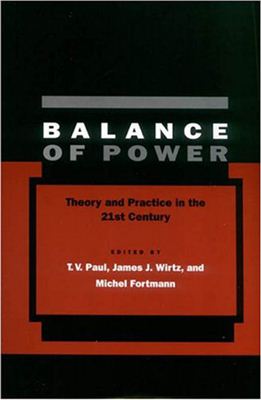Stanford University Press, 2004. 384 p.
Since the 16th century, balance of power politics have profoundly influenced inteational relations. But in recent years—with the sudden disappearance of the Soviet Union, growing power of the United States, and increasing prominence of inteational institutions—many scholars have argued that balance of power theory is losing its relevance. This book examines the current position and future of balance of power dynamics in inteational politics.
In this book, prominent scholars pay special attention to the theoretical and historical criticisms of balance of power theory while empirically assessing its validity at both global and regional levels. The volume also looks at systemic factors favoring or hindering a retu to balance of power politics. It evaluates the challenges posed by subnational actors, such as terrorist groups, and weapons of mass destruction to inteational order. Further, it examines the relevance of balance of power axioms in selected regions: Weste Europe, Easte Europe, East Asia, South Asia, and Latin America.
The Enduring Axioms of Balance of Power Theory and Their Contemporary Relevance. T. V. Paul
Theories of Balance of Power and Major Powers
What Do Great Powers Balance Against and When? Jack S. Levy
Great Powers in the Post-Cold War World: A Power Transition Perspective. Douglas Lemke
The Political Economy of Balance of Power Theory. Mark R. Brawley
New Security Challenges and Balance of Power
The War on Terrorism and the Balance of Power: The Paradoxes of American Hegemony. Christopher Layne
The Balance of Power Paradox. James J. Wirtz
A World Not in the Balance: War, Politics, and Weapons of Mass Destruction. Edward Rhodes
Regional Subsystems and Balance of Power
Europe Hedges Its Security Bets. Robert J. Art
Revisiting Balance of Power Theory in Central Eurasia. William C. Wohlforth
The Inteational System and Regional Balance in the Middle East. Benjamin Miller
Bipolarity and Balancing in East Asia. Robert S. Ross
The South Asian Security Balance in a Weste Dominant World. Raju G. C. Thomas
Regime Type and Regional Security in Latin America: Toward a Balance of Identity Theory. Michael Barletta and Harold Trinkunas
Conclusions: Balance of Power at the Tu of the New Century. Michel Fortmann, T. V. Paul, and James J. Wirtz
Since the 16th century, balance of power politics have profoundly influenced inteational relations. But in recent years—with the sudden disappearance of the Soviet Union, growing power of the United States, and increasing prominence of inteational institutions—many scholars have argued that balance of power theory is losing its relevance. This book examines the current position and future of balance of power dynamics in inteational politics.
In this book, prominent scholars pay special attention to the theoretical and historical criticisms of balance of power theory while empirically assessing its validity at both global and regional levels. The volume also looks at systemic factors favoring or hindering a retu to balance of power politics. It evaluates the challenges posed by subnational actors, such as terrorist groups, and weapons of mass destruction to inteational order. Further, it examines the relevance of balance of power axioms in selected regions: Weste Europe, Easte Europe, East Asia, South Asia, and Latin America.
The Enduring Axioms of Balance of Power Theory and Their Contemporary Relevance. T. V. Paul
Theories of Balance of Power and Major Powers
What Do Great Powers Balance Against and When? Jack S. Levy
Great Powers in the Post-Cold War World: A Power Transition Perspective. Douglas Lemke
The Political Economy of Balance of Power Theory. Mark R. Brawley
New Security Challenges and Balance of Power
The War on Terrorism and the Balance of Power: The Paradoxes of American Hegemony. Christopher Layne
The Balance of Power Paradox. James J. Wirtz
A World Not in the Balance: War, Politics, and Weapons of Mass Destruction. Edward Rhodes
Regional Subsystems and Balance of Power
Europe Hedges Its Security Bets. Robert J. Art
Revisiting Balance of Power Theory in Central Eurasia. William C. Wohlforth
The Inteational System and Regional Balance in the Middle East. Benjamin Miller
Bipolarity and Balancing in East Asia. Robert S. Ross
The South Asian Security Balance in a Weste Dominant World. Raju G. C. Thomas
Regime Type and Regional Security in Latin America: Toward a Balance of Identity Theory. Michael Barletta and Harold Trinkunas
Conclusions: Balance of Power at the Tu of the New Century. Michel Fortmann, T. V. Paul, and James J. Wirtz

